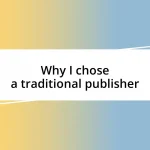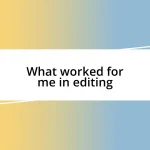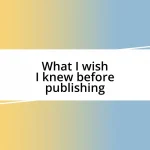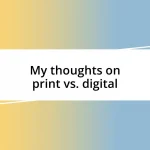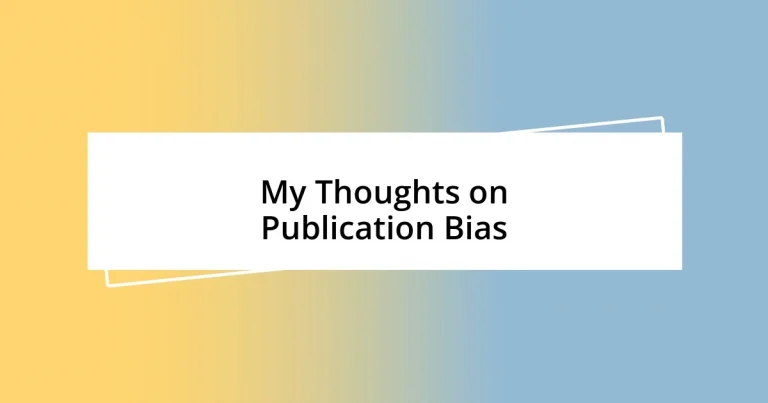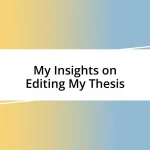Key takeaways:
- Publication bias skews scientific understanding, leading to an incomplete picture where only positive results are often shared, which can stifle innovation and honesty in research.
- Causes of publication bias include researcher pressure to produce favorable outcomes, journal preferences for groundbreaking findings, and reviewer biases that overlook negative results.
- Mitigation strategies involve registering studies beforehand, encouraging publication of all results, and fostering interdisciplinary collaboration to challenge conventional biases.
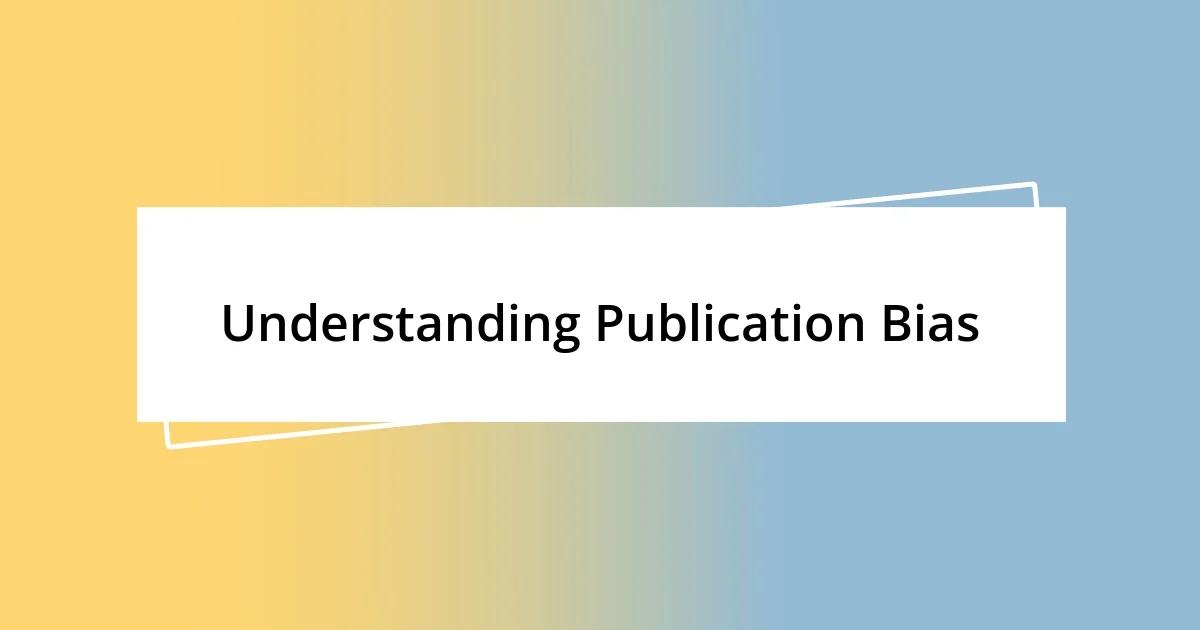
Understanding Publication Bias
Publication bias is a phenomenon that occurs when the outcomes of research influence whether or not studies get published. I remember a time in my academic career when I found an exciting study that challenged widely held beliefs, but it never saw the light of day. This made me wonder: how many groundbreaking ideas are we missing simply because the results weren’t favorable?
It’s disheartening to think about how this bias can cloud our understanding of a topic. For instance, if you only read published studies, you might conclude that a particular treatment is highly effective, while unpublished data could tell a different story. Have you ever thought about how this affects the way we perceive scientific truth? It creates an incomplete picture, often skewing the narrative in favor of positive outcomes.
Furthermore, publication bias contributes to a cycle where researchers may feel pressured to produce results that are more likely to be published. This reality can stifle innovation and discourage honesty in research. I often reflect on the ethical implications: Are we, as a community, prioritizing sensational results over genuine exploration? It’s a complex issue that deserves closer scrutiny and open dialogue.
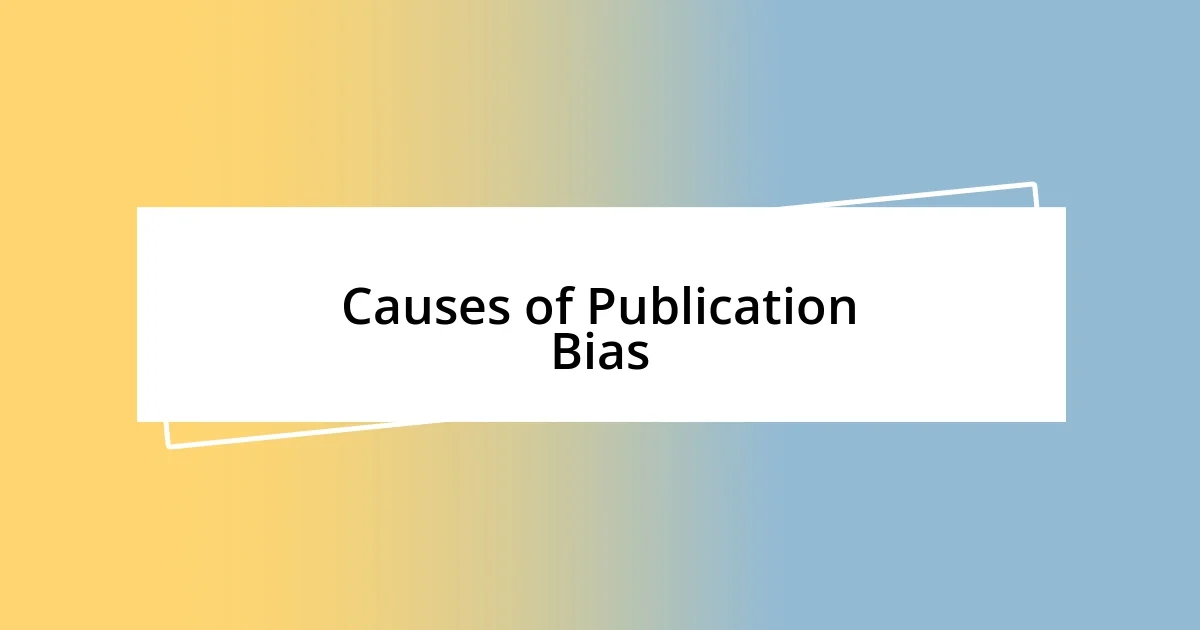
Causes of Publication Bias
Publication bias has several underlying causes that shape the academic landscape. Firstly, researchers often feel compelled to publish only studies with positive or significant results, as these are typically seen as more valuable or impactful. I’ve encountered many discussions with peers who admit they’ve tailored their study designs to ensure they achieve favorable outcomes, believing it will enhance their chances of publication. This pressure can lead to a reluctance to pursue more nuanced or exploratory research, which can be detrimental to scientific progress.
Another contributing factor is the preferences of journals and funding organizations. Many of them prioritize groundbreaking findings or results that align with current trends and interests. I remember submitting a piece of work that challenged existing paradigms, only to be met with rejection because it didn’t fit the journal’s “exciting” criteria. This led me to question how often groundbreaking insights are discarded simply because they don’t conform to prevailing biases within the publication ecosystem.
Lastly, there’s the role of peer reviewers, who may exhibit biases themselves when evaluating research. Their personal beliefs and experiences can influence their judgment on what constitutes valuable science, potentially overlooking studies with negative or inconclusive results. Reflecting on my experiences, I can’t help but wonder how many innovative ideas have been left on the cutting room floor because they didn’t resonate with the reviewers’ perspectives.
| Cause | Description |
|---|---|
| Researcher Pressure | Researchers often pursue positive results to increase chances of publication. |
| Journal Preferences | Journals favor groundbreaking findings over nuanced research. |
| Reviewer Bias | Peer reviewers may overlook valuable studies due to personal biases. |
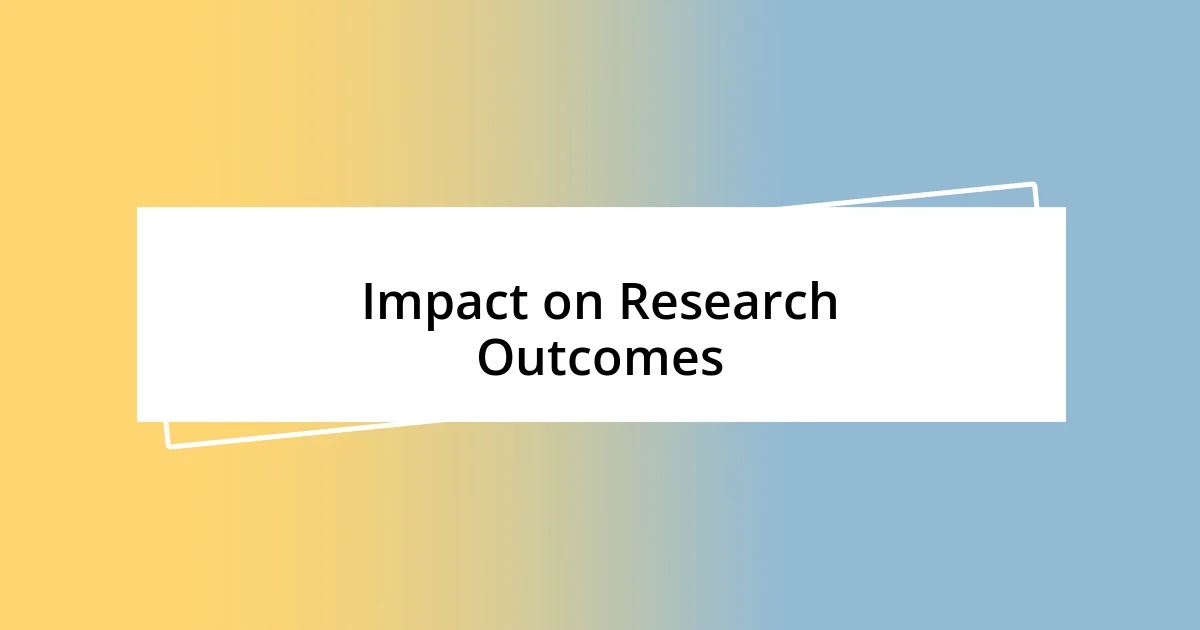
Impact on Research Outcomes
The impact of publication bias on research outcomes is profound, shaping not only what gets published but also what gets taken seriously within the scientific community. I often find it unsettling when reflecting on studies that reach the public eye, knowing that many important findings may remain hidden just because they didn’t fit the ‘acceptable’ mold. This can lead us into a precarious situation where our understanding of a field is based on cherry-picked data rather than a true representation of reality.
- Misleading Conclusions: Relying solely on published studies can give a skewed view of effectiveness, particularly in fields like medicine.
- Wasted Resources: Research funds might be allocated to repeated studies on popular topics while neglecting important areas needing exploration.
- Stagnant Innovation: A limited view of research outcomes can stifle novel ideas and fresh approaches in scientific inquiry.
The ripple effect of this bias can sometimes be a source of frustration for me. When I think of my peers who tirelessly pursue innovative lines of inquiry, only to have their work sidelined because of unfavorable results, it inspires a mix of sympathy and anger. This environment often leads researchers to retreat to safer topics, which diminishes the diversity of scientific exploration. I can’t help but feel that we’re collectively missing out on transformative breakthroughs due to the constraints imposed by publication practices.
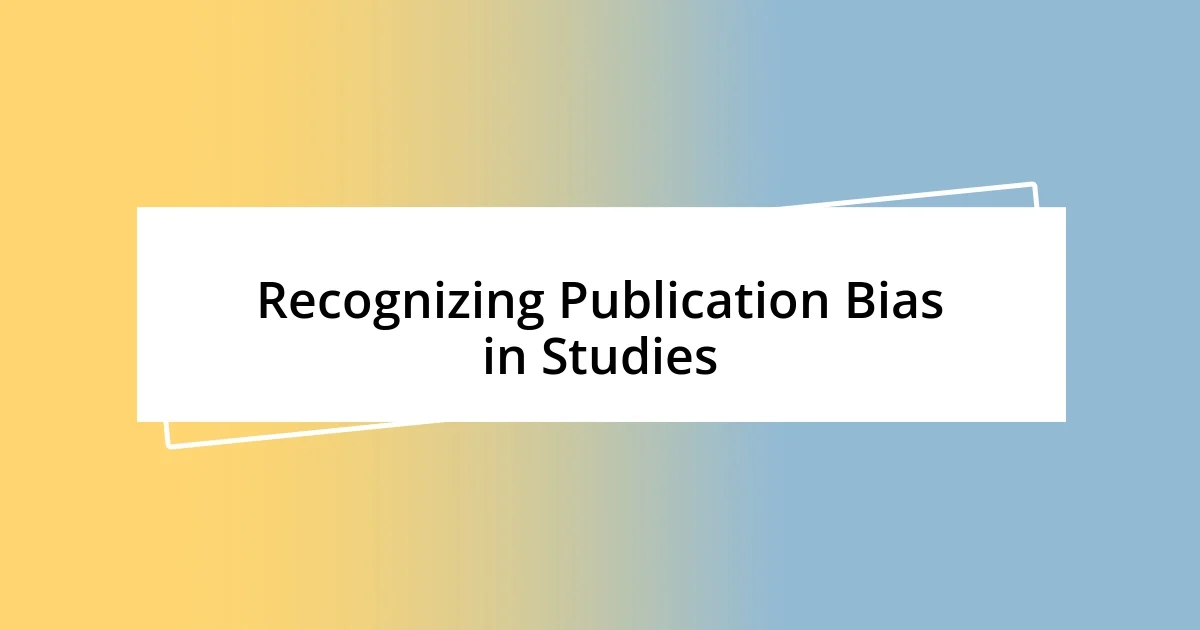
Recognizing Publication Bias in Studies
When I evaluate studies, I’ve developed a heightened awareness of the red flags associated with publication bias. For instance, when I see only a handful of studies supporting a popular hypothesis without corresponding research offering alternative perspectives, I can’t help but wonder what we’ve missed. It’s almost like piecing together a puzzle that’s missing half of its pieces—how can we truly understand the full picture?
My experiences have taught me to look for transparency and thoroughness in research methodologies. If a study’s results seem too good to be true or lack a comprehensive exploration of negative findings, that’s a potential sign of bias. It reminds me of a project I worked on where I was encouraged to omit certain findings that didn’t align with our desired outcomes. That moment truly opened my eyes to how easily essential data can be disregarded in favor of a more favorable narrative.
Moreover, I’ve noticed that the language used in abstracts or discussions can sometimes mask the reality of publication bias. Terms like “promising” or “worth exploring” often complicate the interpretation of results. Reflecting on my own writing, I strive to be as transparent as possible, but I often wonder if others share this commitment. How many researchers, under the pressure to conform, choose compelling narratives over the honesty of their findings? Recognizing these patterns empowers us to seek out the full spectrum of research, fostering a better understanding of the topics we care about.
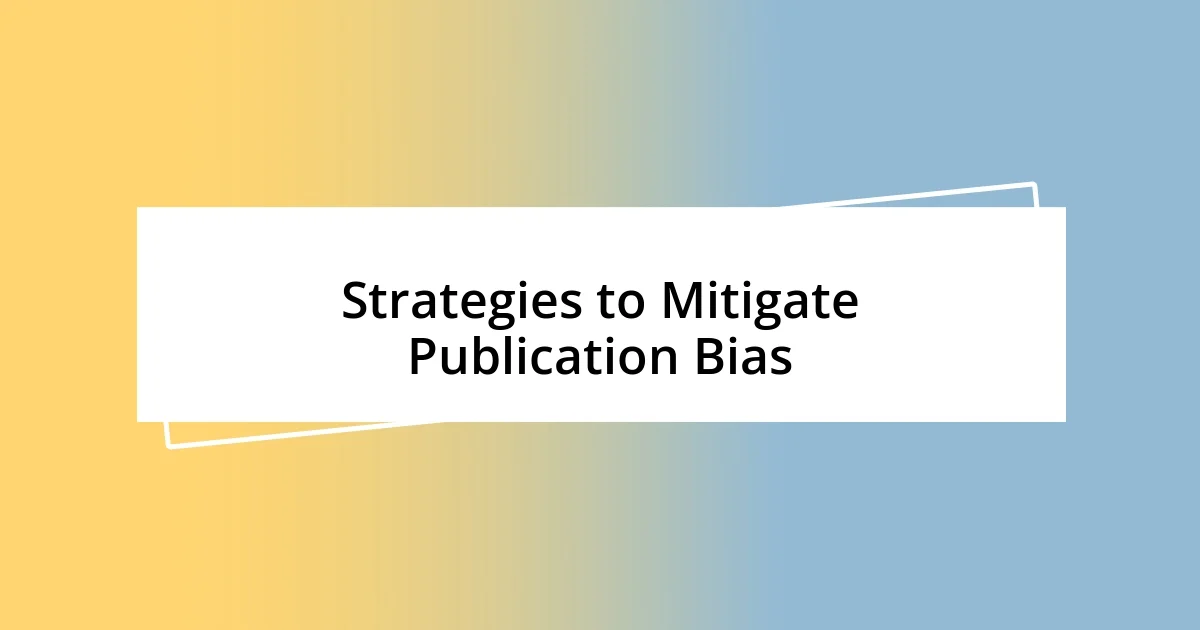
Strategies to Mitigate Publication Bias
To mitigate publication bias, researchers should prioritize the registration of studies and their protocols before data collection begins. This practice not only ensures transparency but also provides a comprehensive record of the original hypotheses and methodologies used. Reflecting on a project I was involved in, registering our study beforehand helped us stay accountable to our objectives, even when unexpected results emerged. It really solidified my belief that having a clear roadmap promotes authenticity in reporting.
Another strategy is to encourage the publication of negative or inconclusive results. I remember a journal I once submitted to that actively sought out studies with mixed outcomes. At first, I doubted the value of my findings, but seeing them published opened my eyes to the greater narrative they contributed to. How many discoveries remain obscure simply because they don’t fit the ‘success’ model? By creating a culture that embraces all outcomes, we enrich the scientific discourse and build a more honest foundation for future research.
Lastly, fostering interdisciplinary collaboration can be a game-changer. When I collaborate with colleagues from different fields, I often find fresh perspectives that challenge conventional wisdom. For example, during a joint project with social scientists, our discussions unearthed biases in my own approach I hadn’t considered. Isn’t it fascinating how diverse views can unearth new questions? Inviting varied expertise can help dismantle the rigid paradigms that contribute to publication bias, paving the way for innovative insights and a more nuanced understanding of our research landscape.
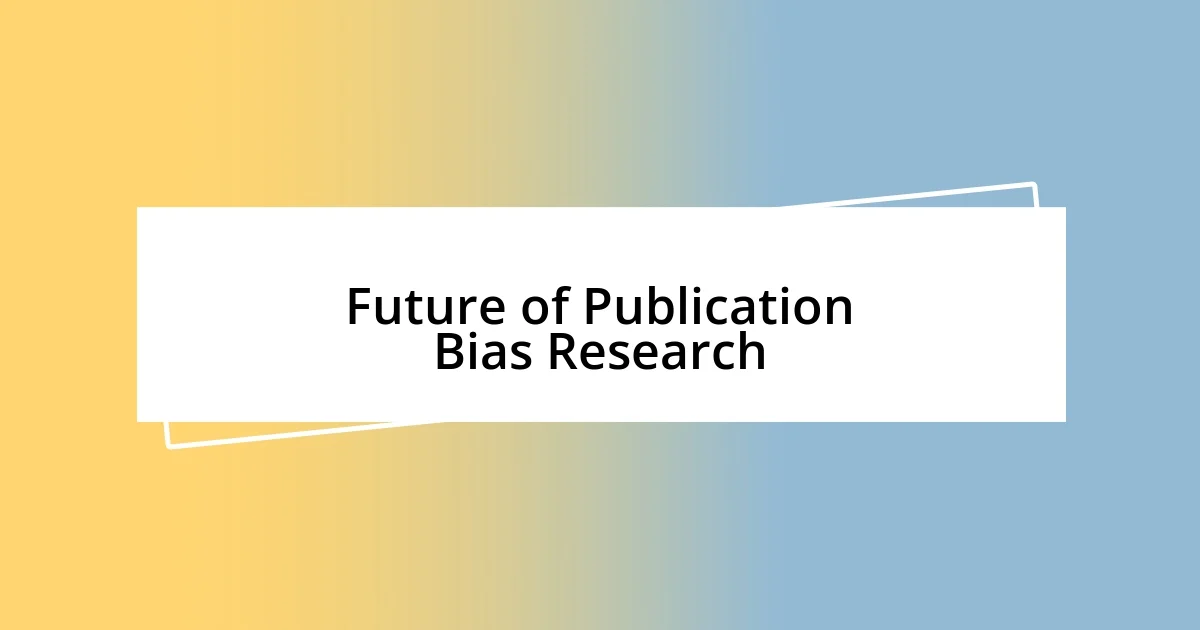
Future of Publication Bias Research
One promising direction for future research on publication bias involves enhancing methods for detecting and correcting bias in published literature. Personally, I recall a research seminar where we delved into advanced statistical techniques designed to identify biases in meta-analyses. The thrill of uncovering hidden biases felt like being a detective uncovering the truth in a crime story. Isn’t it exciting to think that these innovative tools can empower researchers and readers alike to uncover the full narrative behind the numbers?
Incorporating technology, such as machine learning and AI, could revolutionize the way we approach publication bias research. I recently stumbled upon a project that utilized AI to scan thousands of papers for patterns in publication. The potential to automate this process fascinates me, as it could save countless hours for researchers while offering deeper insights into bias trends. What if we created sophisticated algorithms that not only detected bias but also suggested areas where research is lacking? Such advancements could redefine our understanding of the scientific landscape and catalyze meaningful change.
Moreover, engaging researchers in open discussions about publication bias is crucial for future progress. I remember attending a panel where scholars candidly shared their struggles with bias and the pressures to conform. Hearing their stories sparked a profound realization: addressing this issue isn’t just a methodological concern; it’s a human one. How can we build a more genuine research community if we’re not willing to be vulnerable about our challenges? By fostering an environment of transparency and openness, we can collectively work towards solutions that enrich the academic dialogue and ensure more balanced research narratives.
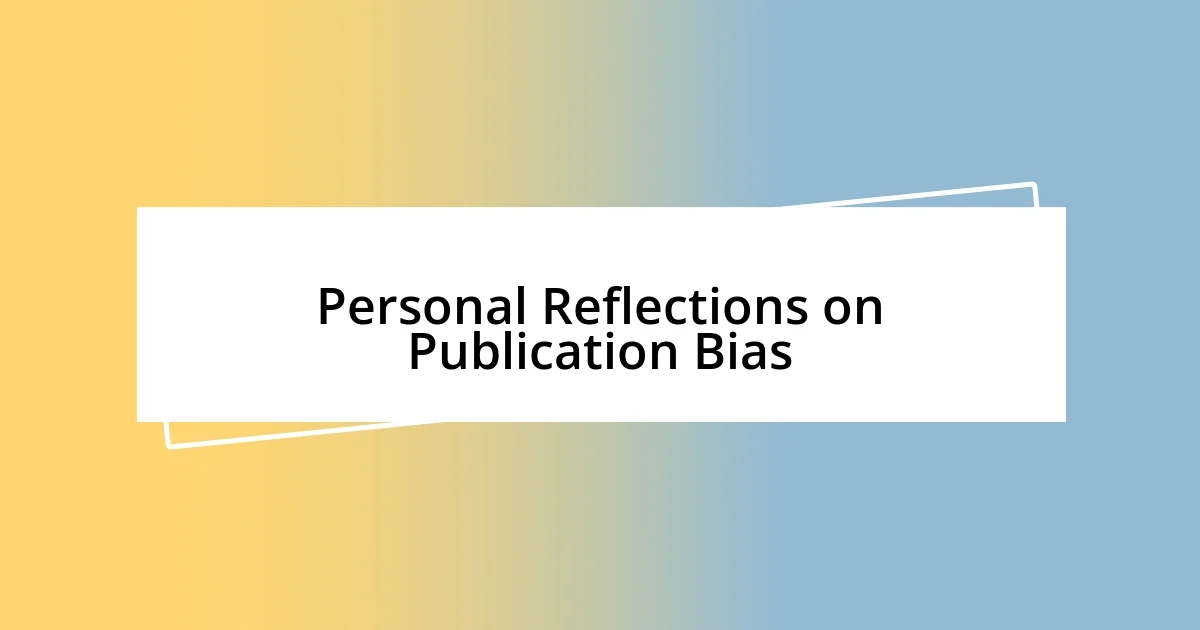
Personal Reflections on Publication Bias
Reflecting on my experiences, I can’t help but feel a twinge of frustration when I think about publication bias. Early in my career, I eagerly submitted a paper with results that didn’t align with the prevailing narrative. It was disheartening to face rejection based on a lack of ‘exciting’ findings. Looking back, I wonder how many valuable insights are lost simply because they don’t fit into a neat box. This realization has made me appreciate the importance of diverse outcomes in research.
One aspect that strikes me is how publication bias influences our understanding of reality. During a conference, I listened to a speaker who highlighted how studies with negative results rarely see the light of day. I found myself questioning why we prioritize positive results over a fuller picture. It’s a bit like looking at a map that only shows the highlights; you miss the valleys and turns that give context to the journey. My own research encounters have opened my eyes to the need for a more inclusive approach to publishing.
I often reflect on the broader implications of publication bias, especially in shaping public perception. When the media cherry-picks studies to report on, it can skew public understanding. I remember feeling a sense of responsibility when discussing my findings with friends who were keen to grasp the complexities of our research. I realized then that the narrative we share matters—what if we start changing the conversation? By promoting transparency and accuracy in our work, perhaps we can inspire a more informed and curious society.


